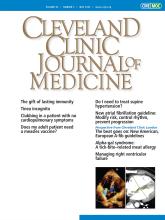Article Figures & Data
Tables
Elevated liver enzyme levels: general principles
Consider etiologies unrelated to COVID-19, including Hepatitis A, B, and C
Avoid imaging of the liver unless it is likely to change management, as in the case of suspected venous thrombosis or biliary obstruction
Therapies for COVID-19 (including remdesivir or hydroxychloroquine) may increase liver enzymes but are not contra-indicated in patients with baseline abnormal liver tests
Regularly monitor liver enzymes in patients hospitalized with COVID-19
Elevated liver enzyme levels in liver transplant recipients or auto-immune hepatitis
Acute cellular rejection or disease flare should not be assumed without biopsy confirmation
Elevated liver enzyme levels in children
Because abnormal liver enzymes are uncommon in children with COVID-19, underlying liver disease or infection should be ruled out
Based on information from Fix, et al.1
- TABLE 2
Recommendations for outpatient management of patients with decompensated cirrhosis, for liver transplant evaluations, and on a transplant waiting list during the COVID-19 pandemic
Clinic visits and consultations
Continue to prioritize in-person transplant evaluations for patients with hepatocellular carcinoma or severe disease and high MELD scores, who are likely to benefit from immediate liver transplant listing
Consider telemedicine or virtual alternatives for less urgent patients
Consider developing online education programs and avoid group sessions for patient education
Consider using a “COVID-19-free” path through the hospital for transplantation candidates
Laboratory testing and imaging
Obtain labs and imaging only if clinically necessary and do not update labs or imaging simply to update MELD score
Obtain SARS-CoV-2 testing for patients with new onset hepatic decompensation
Medications
Ensure refills are available for essential medications
Prescribe 90-day supplies instead of 30-day supplies
SARS-CoV-2 positive patients
Have a low threshold for hospitalizing patients on the transplant waiting list who develop COVID-19
General recommendations
Advise patients to avoid in-person community support group meetings and provide virtual alternatives
Advise patients to avoid travel during the pandemic
MELD = model for end-stage liver disease
Based on information from Fix, et al.1






